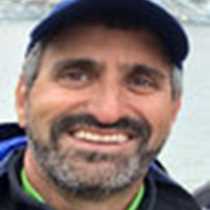Gdansk
Poland, a nation of 38 million, is the largest of the new entrants to the European Union. This state has always been a place between, a land split and controlled by many powers in its history – a true reflection of both west and east. Today we visited the Polish port town of Gdansk on the Vistula River, which leads 500 miles inland to the capital of Warsaw. The town has been in the hands of Teutonic Knights, the Hanseatic League, Prussia, Russia, and Germany. Gdansk’s heyday was at the turn of the 17th century. The old city we explored today still looks as it did then. However, the free city-state, known at the time as Danzig, was devastated by bombs during the Second World War; ninety percent of the town’s buildings had to be rebuilt.
We berthed in the famous shipyard of Gdansk, exactly where Germany first attacked Poland, launching World War II. Nearby, we visited the towering monument at the gates of the dockyard where the Solidarity struggle catalyzed the collapse of Communism.
The leader of the Solidarity movement is an old friend of Lindblad Expeditions, and we were graced today with a visit to our ship by none other than Lech Walesa. The former President of Poland shared his personal history of Poland’s politics and independence, as well as insights on global matters. Nobel Peace Prize winner Walesa attributed the fall of Communism to three components: his Solidarity movement in the shipyards of Gdansk, Russian politics at the time, and a timely visit by a newly appointed Polish Pope who told the people to “be not afraid to transform the face of this Earth.”
President Walesa came a long way from simple dockyard electrician to world leader, and his presentation was not without humor, nor amusing analogies. Stalinism in Poland was ‘like putting a horse saddle on a pig.’ Polish communists were ‘like radishes, red only on the outside, white inside.’ Getting communism out of capitalism is easy, ‘like getting fish soup out of an aquarium, but getting the aquarium back from the soup is hard.’ Helping Russia now after the break-up of the satellite states is ‘like a polar bear that’s fallen in a hole in the ice. It’s too heavy to lift up by just the head; it can only be helped by many hands lifting the whole body together.’
The wisdoms of Lech Walesa, our walking explorations of the old city, and Zodiac cruises through the famous shipyards made a fascinating introduction to the history of Gdansk and Poland.
Poland, a nation of 38 million, is the largest of the new entrants to the European Union. This state has always been a place between, a land split and controlled by many powers in its history – a true reflection of both west and east. Today we visited the Polish port town of Gdansk on the Vistula River, which leads 500 miles inland to the capital of Warsaw. The town has been in the hands of Teutonic Knights, the Hanseatic League, Prussia, Russia, and Germany. Gdansk’s heyday was at the turn of the 17th century. The old city we explored today still looks as it did then. However, the free city-state, known at the time as Danzig, was devastated by bombs during the Second World War; ninety percent of the town’s buildings had to be rebuilt.
We berthed in the famous shipyard of Gdansk, exactly where Germany first attacked Poland, launching World War II. Nearby, we visited the towering monument at the gates of the dockyard where the Solidarity struggle catalyzed the collapse of Communism.
The leader of the Solidarity movement is an old friend of Lindblad Expeditions, and we were graced today with a visit to our ship by none other than Lech Walesa. The former President of Poland shared his personal history of Poland’s politics and independence, as well as insights on global matters. Nobel Peace Prize winner Walesa attributed the fall of Communism to three components: his Solidarity movement in the shipyards of Gdansk, Russian politics at the time, and a timely visit by a newly appointed Polish Pope who told the people to “be not afraid to transform the face of this Earth.”
President Walesa came a long way from simple dockyard electrician to world leader, and his presentation was not without humor, nor amusing analogies. Stalinism in Poland was ‘like putting a horse saddle on a pig.’ Polish communists were ‘like radishes, red only on the outside, white inside.’ Getting communism out of capitalism is easy, ‘like getting fish soup out of an aquarium, but getting the aquarium back from the soup is hard.’ Helping Russia now after the break-up of the satellite states is ‘like a polar bear that’s fallen in a hole in the ice. It’s too heavy to lift up by just the head; it can only be helped by many hands lifting the whole body together.’
The wisdoms of Lech Walesa, our walking explorations of the old city, and Zodiac cruises through the famous shipyards made a fascinating introduction to the history of Gdansk and Poland.




